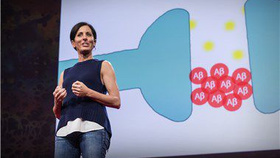How many people here would like to live to be at least 80 years old? Yeah.
在座有多少人希望能活到八十歲以上?好。
I think we all have this hopeful expectation of living into old age.
我想我們每個人都渴望能夠長壽。
Let's project out into the future, to your future "you's," and let's imagine that we're all 85.
讓我們穿越到未來,未來的你們假設都已85歲。
Now, everyone look at two people. One of you probably has Alzheimer's disease.
我們隨便挑選兩個人,其中一人就可能患有老年癡呆癥。
Alright, alright. And maybe you're thinking, "Well, it won't be me." Then, OK.
好吧,好吧。也許你會想:“反正不會是我”。那么好的。
You are a caregiver. So -- so in some way, this terrifying disease is likely to affect us all.
你是另一位的照顧人。所以……所以某種意義上來說,這個可怕的疾病可能會影響我們每一個人。

Part of the fear around Alzheimer's stems from the sense that there's nothing we can do about it.
對于老年癡呆的恐懼部分源于我們對此的無能為力。
Despite decades of research, we still have no disease-modifying treatment and no cure.
盡管幾十年的研究下來,我們依然沒有改善病情的方法。
So if we're lucky enough to live long enough, Alzheimer's appears to be our brain's destiny.
如果我們有幸長命百歲,老年癡呆似乎是我們大腦的宿命。
But maybe it doesn't have to be. What if I told you we could change these statistics,
情況也許沒有這么糟。如果我告訴你,我們可以改變現狀,
literally change our brain's destiny, without relying on a cure or advancements in medicine?
就是改變我們大腦的命運,不依賴于任何療法或是藥物的發展呢?











